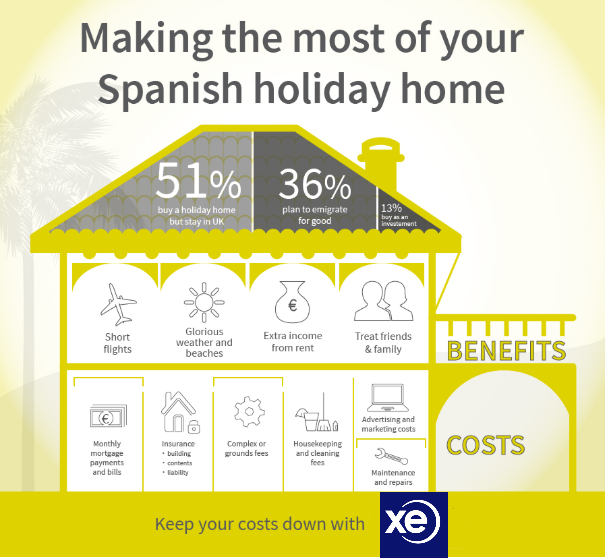
Making the Most of your Spanish Holiday Home
7 de abril de 2016 — 9 min read
Spain is one of the most popular destinations for British people to buy holiday homes, and it’s not difficult to see why. Spain offers glorious weather and beaches for a relaxing retreat, whilst only being a short flight away from the UK for an easy getaway.
If you are thinking of buying a holiday home in Spain yourself, or even have one already, our team of experts have taken a look at everything you need to know about the process, and how to get the best value for your money.
Leasing out your holiday property
According to a Rightmove report, 51 per cent of those looking to make a purchase in the future will be buying a holiday home but will stay in Britain, while just over one third plan to emigrate for good and 13 per cent buy as an investment.
The average holiday home owner only visits their property once or twice a year, which explains why most people tend to let it out to tourists whilst they aren’t staying in it themselves. This provides a great source of income and means your property isn’t being wasted by standing empty for the majority of the year.
How much will a good property cost?
The current price range in Spain for a 2 bedroom, 2 bathroom property in a gated complex, close to shops, bars restaurants and within a short drive of the coast is typically €115,000 (£89,843) – €160,000 (£125,000). Townhouses and semi-detached properties start at around €150,000 and detached villas from around €180,000.
There are many properties for sale for much lower than €115,000, but if you are hoping to make money from renting your holiday home out, these properties will leave some of the “must have” boxes unticked. For example, if the location is right, the property itself may not be up to standard because it doesn’t have access to a pool, or is a long distance from bars and restaurants. Buying a property that is not fit for the competitive rental market could leave you struggling when it comes to bookings.
How much income can you expect to receive?
Income received from your rental property will depend on a number of factors. This includes the appeal of the property itself and how well you market it. If holidaymakers have a great experience staying in your holiday home and you receive positive feedback and reviews, Expect a number of guests to return year after year. This means the amount you receive in year 3 and 4 of renting out your property could be significantly higher than year one or two.
A typical 2 bedroom, 2 bathroom modern apartment will typically let from €450-€750 per week during the summer months and from €250-€350 in the winter.
A modern detached villa with a pool would cost in excess of €1,000 per week in the summer but could be significantly more depending on the size and location. During the winter, when factors such as a pool and proximity to a beach are not as important, rental income is often less than half this amount.
The typical costs of running a holiday rental business
Although renting out your holiday home can provide a great source of income, there are also a number of costs that you must account for when you begin to plan on how you are going to make the business work.
Your monthly mortgage payments and bills (including interest, taxes & insurance)
The cost of your mortgage rate should be fixed, so it’s easy to determine what your annual expenses should be (e.g. x12 your monthly payments). Only the final three costs are expenses generated by turning your second home into a holiday rental. You will also have to pay for gas and electricity bills, which can be expensive when your property is air conditioned.
When it comes to letting taxes, you must ensure that you declare your rental income to the Spanish tax authorities (Agencia Tributaria), whether you are resident in Spain or not. Taxation is a complex issue, and it is advisable to seek the advice of an accountant or professional tax adviser with comprehensive and up to date knowledge of both the UK and Spanish tax regulations.
Insurance (building, contents and liability)
Just like in the UK, you will need buildings and contents insurance for your holiday home, as communal insurance will only cover the common parts of the blocks and usually nothing for your individual property. Some insurers also include public liability insurance, loss of rent following a claim, emergency travel and accommodation as standard too. You should add accidental damage coverage to your policy for family, friends and holiday tenants. The cost of insurance differs from property to property; the average cost to insure a three-bed villa with a pool in the Costa Blanca with £10,000 contents and full accidental damage cover is €393 (£306)* per year.
Complex or grounds fees (if you own an apartment that is part of a complex)
Almost all properties that are part of a development (including apartments and villas that share communal areas and facilities) are classed as community properties. In general, the only properties that do not belong to a community are detached houses built on individual plots in public streets or on rural land. If you are an owner of a community property, you automatically become a member of the community of owners, so you also own a share of the communal areas of the building or development. This includes foyers, hallways, passages, lifts, gardens, patios, roads, swimming pools, and leisure and sports facilities.
You have to pay community fees towards maintaining these areas, which are calculated to each owner’s share. The cost normally varies depending on the size of your property and the type of community it is situated in. For example, fees for a studio apartment in a small, older complex may be as little as €150 (£115) a year, whereas fees for a large luxury penthouse in a modern and prestigious development can be over €3,000 (£2,310) a year. Fees for a typical two-bedroom apartment costing around €120,000 are €300 (£231) to €1,000 (£770) a year.
Housekeeping and cleaning fees
Your property must always be spotlessly clean when holidaymakers arrive and you should provide basic cleaning equipment. This includes laundering any linen in the property, such as bedding and towels. You must arrange for cleaning in between lets and also at regular intervals, e.g. weekly or twice-weekly, for lets of more than one week.
If you use a local agent, they usually arrange cleaning at your expense, which is currently around €8 to €10 an hour in coastal resorts. If applicable, you must also arrange pool cleaning and a gardener. An alternative option that could save you money would be to get in touch with some local expats who live close to your property. Expats often work part time by helping look after holiday homes, and will often charge less than an agency.
Maintenance and repairs
If any maintenance or repairs have to be carried out at your property for any reason, you are responsible for resolving the problem and paying for it. If you are visiting the property regularly yourself, it is important to check any areas that are likely to need maintenance. Also, if you are investing in the help of other expats for duties such as cleaning, then it is worth finding out if any of them can carry out maintenance duties themselves, so if any problems arise whilst the property is being rented out they can be the holidaymakers’ point of contact. Maintenance and repairs would still need to be paid whether you rent to travellers or not, but it’s likely you will need to spend more if you have paying guests in mind.
Advertising and Marketing costs
If you do decide to let out your property to tourists, one of the most important decisions you will have to make is whether you use a letting agent, or do it all yourself. An agent will take care of everything and save you the time and cost of advertising and finding clients to fill your property. However, they will usually charge a commission of between 20% and 40% of the gross rental income, plus agency fees. It is also worth noting that many agents do not permit owners to use the property themselves in peak months such as July and August.

The cheaper option to using a letting agent is of course to let out the property yourself. There are hundreds of places to advertise on the internet, as well as brochures and Spanish newspapers and magazine. Social media can be an excellent way of marketing your property - and it's free. It is worth getting professional photographs taken of your property to really show it off.
If you do choose to let out the property yourself, then you are in charge of all of the communication with the holidaymakers, and will have to arrange someone to meet and greet them. Again, this is the perfect opportunity to get local expats involved, as they can often arrange to pick people up from the airport if needed, give them the keys, and be the general point of contact.
Some owners prefer to let a property to family, friends, colleagues and acquaintances, which allows them more control so the property will be better looked after. However, as you will not be maximising guest bookings this way, you are unlikely to receive as much income.
If you do decide to buy a holiday property in Spain and rent it out, then you will definitely be transferring money between Spain and the UK. To set up your XE account, and have all of your international money transfers covered, click here.
*The above figures are based on the interbank rate, correct as of 16:00 on 11/03/16, and are provided for indicative purposes only.
The information, materials, accompanying literature and documentation available on our internet site is for information purposes only and is not intended as a solicitation for funds or a recommendation to trade. XE, its officers, employees and representatives accept no liability whatsoever for any loss or damages suffered through any act or omission taken as a result of reading or interpreting any of the above information.
While we take reasonable care to keep the information on the website accurate and up to date, there may be occasions when this is not possible. Case Studies and articles are not intended to predict future moves in exchange rates or constitute advice.
XE makes no representations, warranties, or assurances as to the accuracy or completeness of any information derived from third party sources. If you are in any doubt as to the suitability of any foreign exchange product that you are intending to purchase from XE, we recommend that you seek independent financial advice first.
For more information about XE, please click here: Regulatory Information
Related Posts

4 de diciembre de 2023 — 4 min read

18 de enero de 2023 — 6 min read

30 de julio de 2020 — 4 min read

12 de julio de 2019 — 6 min read

1 de julio de 2019 — 6 min read

10 de enero de 2019 — 5 min read